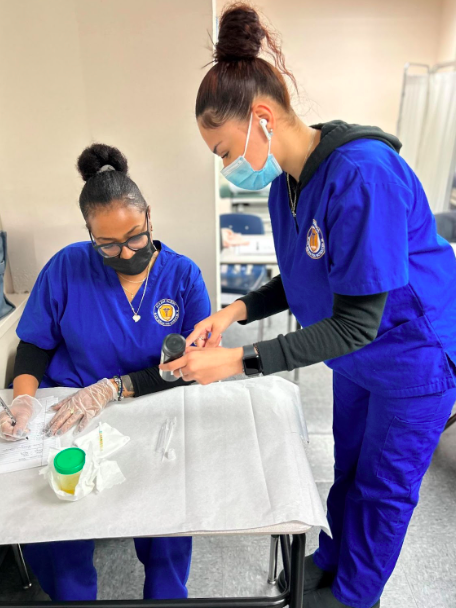
Hands on learning is crucial in a Medical Assistant program for several reasons:
- Skill Development: Medical assisting involves a wide range of clinical and administrative tasks that require practical skills. Hands on learning allows students to practice and develop these skills in a controlled environment. For example, students can learn how to take accurate vital signs, administer injections, perform EKGs, or assist with minor surgical procedures. By actively engaging in these tasks, students gain confidence and proficiency, which are essential for their future roles as Medical Assistants. At the Allen School of Health Sciences, you will experience hands-on learning in a clinical setting.
- Real World Application: Hands on learning provides students with the opportunity to apply theoretical knowledge to real world scenarios. It allows them to understand how concepts and procedures are carried out in a healthcare setting. By participating in hands-on activities, students can experience the challenges, complexities, and nuances that they will encounter in their future careers. Allen School of Health Sciences Medical Assistant students have 275 hours of internship in a clinical setting as part of their Medical Assistant program. This practical experience enables them to bridge the gap between theory and practice, thereby preparing them for the realities of the job in a real-world setting.
- Patient Safety: Medical Assistants play a crucial role in patient care and their actions directly impact patient safety. Hands on learning allows students to practice proper techniques and protocols, ensuring they can provide safe and effective care. For example, learning how to properly sanitize equipment, administer medications, or handle medical emergencies can help prevent errors and protect patient well-being. Hands on training instills a strong sense of responsibility and emphasizes the importance of following proper procedures to maintain patient safety.
- Professionalism And Communication Skills: Medical Assistants interact closely with patients, healthcare professionals, and colleagues. Hands on learning provides opportunities for students to develop and refine their communication and interpersonal skills. Through simulated patient interactions, students can practice effective communication, active listening, empathy, and professionalism. These skills are essential for building rapport with patients, collaborating with healthcare teams, and providing compassionate care.
Overall, hands-on learning in a medical assisting program is essential for skill development, real world application, patient safety, and the cultivation of professionalism and communication skills. It ensures that students are well prepared to enter the healthcare field and fulfill their roles as competent and compassionate Medical Assistants.
Learn more about hands-on learning as part of your Medical Assistant program. The Allen School of Health Sciences is enrolling now for classes starting soon. Contact us today! www.allenschool.edu
